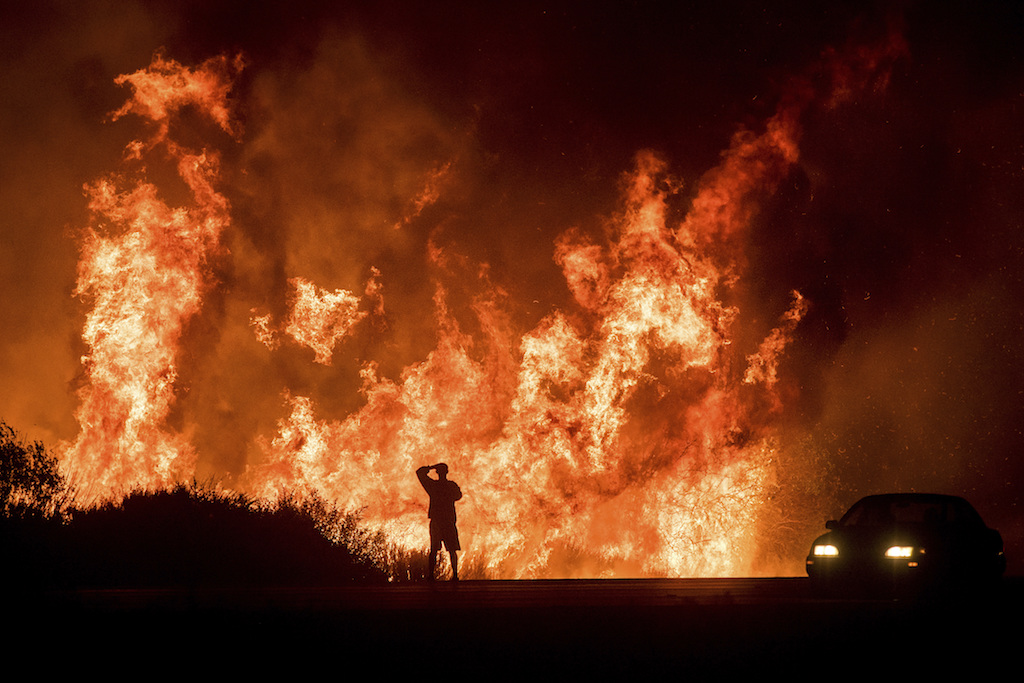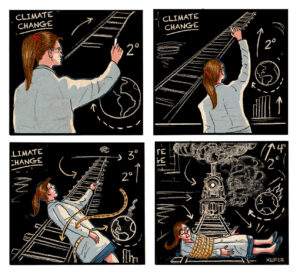The Next 5 Years Could Be the Hottest in Human History
Here is a climate forecast that climate scientists, meteorologists, politicians, voters and even climate skeptics can check. A motorist on Highway 101 watches flames from the Thomas fire leap above the roadway north of Ventura, Calif. (Noah Berger / AP)
A motorist on Highway 101 watches flames from the Thomas fire leap above the roadway north of Ventura, Calif. (Noah Berger / AP)
Here is a climate forecast that climate scientists, meteorologists, politicians, voters and even climate sceptics can check: the next five years will be warm, and will probably help to complete the hottest decade ever.
They will on a global average be at least 1°C higher than the average temperature of the planet 200 years ago, before the accelerating combustion of fossil fuels.
That is because the planet is already midway through what may well prove to be its warmest 10 years since records began on a planetary scale in 1850. There is even a possibility that within the next five years, the global temperature rise could tip 1.5°C above the long-term average for human history.
This is the ambitious limit to global warming that the world set itself at an historic meeting in Paris in 2015, for the year 2100.
And the forecasters can make such predictions with some confidence because tomorrow’s temperature chart is already inscribed in the air we breathe: the pattern of warming over the last century is consistent with the steady rise in greenhouse gas levels in the atmosphere, and these are still increasing because fossil fuel use is still going up.
“Predictions now suggest around a 10% chance of at least one year between 2019 and 2023 temporarily exceeding 1.5°C”
Adam Scaife, who heads long-range prediction research at the UK Met Office, said: “2015 was the first year that global annual average surface temperatures reached 1.0°C above pre-industrial levels and the following three years have all remained close to this level.
“The global average temperature between now and 2023 is predicted to remain high, potentially making the decade from 2014 the warmest in more than 150 years of records.”
Climate is what people can reasonably bank on; weather is what they get. The forecast is significant because it is evidence of swelling confidence in the understanding of global warming and climate change science.
Climate researchers began warning at least 40 years ago of the potentially calamitous consequences of climate change: they were, at the time, unwilling to link any single weather event – flood, drought, windstorm or heat wave – to long-term global warming as a consequence of the steady increase of carbon dioxide in the atmosphere, released from power stations, factory chimneys and vehicle exhausts.
Possible catastrophe predicted
Not any more: in 2013, one group of geographers in Hawaii even predicted the possible onset of catastrophic climate change in some regions of the globe as early as 2020.
And the Met Office prediction is accompanied by a danger that – for a short while at least – the global increase could reach or exceed the level that 195 nations in Paris agreed would be potentially disastrous for human civilisation.
“A run of temperatures of 1.0°C or above would increase the risk of a temporary excursion above the threshold of 1.5°C above pre-industrial levels,” said Doug Smith, a researcher at the Met Office. “Predictions now suggest around a 10% chance of at least one year between 2019 and 2023 temporarily exceeding 1.5°C.”
Global temperatures in 2018 were around 0.91°C above the long-term average. This would make 2018 the fourth warmest year ever, although oceanographers recently warned that the oceans – and 70% of the planet is covered by ocean – reached their warmest ever in 2018.
Almost imperceptible
The three warmest years on record are 2015, 2016 and 2017. Climate scientists – and health chiefs – have consistently warned that the average global increase is at almost imperceptible pace, and is a trend rather than a year-on-year rise. This made it possible for some to argue about the interpretation of the data, and to even claim that global warming had paused.
But within this slow increase in average temperatures, there has been a pattern of increasing extremes of rainfall and temperature with the threat of increasingly frequent and potentially lethal heat waves to come.
And, researchers warned recently, the changes seem inexorable: by multiplying in number to more than 7bn in two centuries, by clearing forests and by burning fossil fuels, humans have managed to reverse a long-term climate trend and make the future uncomfortably hot.
A third UK researcher, Tim Osborn of the University of East Anglia’s Cllimatic Research Unit, spelled it out: “The warmth of 2018 is in line with the long-term warming trend driven by the world’s emissions of greenhouse gases.”
Your support is crucial...As we navigate an uncertain 2025, with a new administration questioning press freedoms, the risks are clear: our ability to report freely is under threat.
Your tax-deductible donation enables us to dig deeper, delivering fearless investigative reporting and analysis that exposes the reality beneath the headlines — without compromise.
Now is the time to take action. Stand with our courageous journalists. Donate today to protect a free press, uphold democracy and uncover the stories that need to be told.






You need to be a supporter to comment.
There are currently no responses to this article.
Be the first to respond.